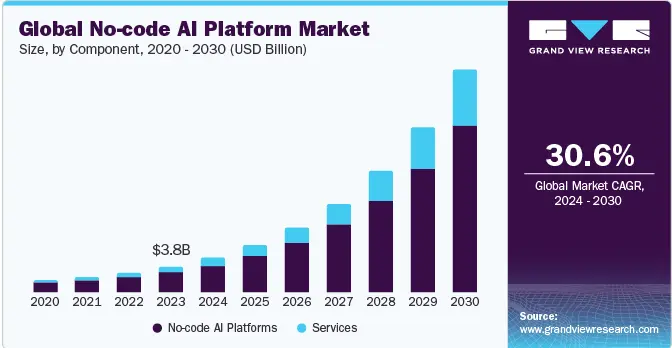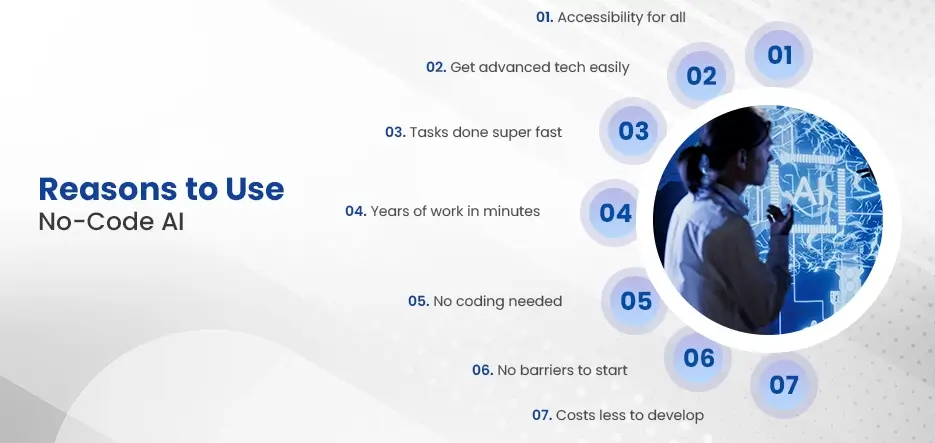No-code AI has revolutionized the way businesses use artificial intelligence. By using no code AI tools, ordinary businesses can implement AI models with no prior experience in data science, development or technology.
In the past, if you wanted to develop a website or mobile application, you had to find an expert developer. However, today, no-code tools let anyone to create these without having to write code.
Global no code AI platform market reached US$ 4,094.7 in 2023. The no-code AI platforms market is projected to reach US$ 49.481.0 million in 2033, with a growth rate of 28.3% between 2023 and 2033.

The same principle could be applied to non-code AI, but this time, the AI technology is much advanced and capable of accomplishing things that we’ve never imagined feasible.
If you’re considering integrating AI in your company, using non-code AI is the simplest and most cost-effective option to go about it. This guide will help you to determine the best AI tools to meet your specific requirements and find out how they can propel your company up a notch.
Table of Contents
What is No-Code AI?
The term “no-code” refers to the process of creating AI that can be defined and used to describe the creation and implementation of AI applications that do not require programming, coding or technical skills. No-code AI for App Development typically works using one of two methods: either an interface that drags and drops elements where users drag and drop elements using an interactive builder, or an interface that allows users to answer questions, and the AI develops the program in response to the answers.
No-code platforms can make artificial machine learning and intelligence models available to everyone, previously something available to those who had technical expertise and special training.
Reasons to Use No-Code AI Platforms
According to FMI, no-code AI platforms account for 16% of global software development. There are many possible reasons and use cases for using a zero-code AI tool. However, at the most fundamental the level each of these can be summarized into three major advantages as per the top mobile application consulting services experts:
- Accessibility
- Speed
- Cost
The three benefits listed above are valid regardless of the particular application of the AI model. The AI model gives companies access to the most advanced technology available, which allows users to achieve more outcomes than they have ever had before.
Anyone can make use of the no-code AI tool without any prior education or experience in the field. This allows the AI tool to complete tasks that normally take months, weeks, or even years in just a few seconds or even minutes. All this can be done with inexpensive or free tools.
There is no need to pay for data scientists or invest years researching the process of natural language processing. With a zero-code AI tool you can begin quickly and have no barriers to entry.

In addition, people with a background in technology or expertise in data science can make even more use of AI-powered workflows. Therefore, regardless of your expertise level, you will benefit by utilizing a no-code AI solution.
20 Best No Code AI Tools To Watch Out For
Below are the essential free no code AI tools to watch out for:
1. Akkio
Akkio is an AI development platform that allows users to build, train and deploy machine learning models without code. Some key features include:
Visual workflow builder: Akkio provides a drag-and-drop interface to design ML pipelines visually. Users can select from pre-built components for tasks like data input, preprocessing, feature engineering, model training and prediction generation. This makes the entire ML development process intuitive for non-programmers.
Automated model training: Once a workflow is designed, Akkio can automatically train ML models on user-uploaded data. It supports popular algorithms like decision trees, random forests, logistic regression etc. Users don’t need expertise in ML algorithms or parameters tuning.
Integrated data and model management: The platform allows users to easily manage datasets, ML experiments, trained models and version history of all assets in a visual registry. Models can also be deployed as API endpoints or via Akkio’s mobile apps. Collaboration features: Multiple users can collaboratively work on the same ML project simultaneously via Akkio’s system. This allows domain experts, data scientists and management to all contribute to the ML development process.
Wide algorithm support: In addition to commonly used algorithms, Akkio supports more advanced techniques like XGBoost, LGBM, neural networks etc. Users can select the most appropriate algorithm for their problem and data.
Pricing: Akkio offers both free and paid subscription plans providing access to advanced features and resources. Thus it remains affordable for top mobile app development companies in USA businesses of all budgets to leverage its no-code ML capabilities.
2. ChatGPT
ChatGPT is an AI assistant created by Anthropic to be helpful, harmless, and honest. Some key characteristics in this one of the best no code AI tools include:
Natural language conversations: Users can have free-flowing conversations with ChatGPT in natural language as they would with another person. It understands and responds to questions, comments and complex statements.
Broad knowledge and reasoning: ChatGPT has been trained on a huge text corpus which allows it to demonstrate broad factual knowledge and apply commonsense reasoning to a variety of topics. It can converse coherently about world events, history, arts, sciences etc.
Personal assistance: The AI is designed to be helpful, providing useful information to users seeking assistance. It can clarify doubts, give recommendations and suggestions, explain complex topics simply based on the context of the conversation.
Harm prevention: To ensure safety, ChatGPT has been carefully evaluated by Anthropic to avoid potential for harm, abuse, bias or provide unacceptable responses. It will not perform any actions that can cause real-world harm.
Transparency: The AI clearly communicates if it does not have an informed answer or understanding of a question. It also acknowledges that it is an AI without human-level intelligence or experience.
Free to use: ChatGPT is freely available for anyone to use through a web interface or browser apps. There are no charges or subscriptions required to access its conversational abilities.
Limitations: As an AI, ChatGPT has limitations in terms of commonsense reasoning, lack of experiences, inability to take actions in the physical world etc. compared to humans.
3. Canva
Canva is a widely popular graphic design no code AI tool that enables creation of marketing materials, social media graphics, presentations, posters, emails and more using drag-and-drop features without design or coding skills. Some of its notable features include:
Huge template library: Canva offers over 1 million professionally created, customizable templates for all kinds of design projects across categories like social media posts, logos, banners, brochures etc.
Readymade elements: The platform provides hundreds of stock images, icons, fonts, illustrations, videos, AU videos etc. that can be just dropped onto the canvas. This streamlines the design process.
Intuitive interface: Users can easily drag and resize images, texts, objects onto the canvas. Features like alignment guides, grids and rulers make designs look polished. Various customization options are available.
Collaboration tools: Multiple users can work together on projects in real-time via Canvas’s comment and review features. Designs can also be published and shared publicly.
Integrations: Canva integrates smoothly with tools like Google Drive, Dropbox, Mailchimp, Google Slides for an end-to-end workflow without switching platforms.
Usage across teams: The platform serves everyone from individual social marketers, students, small business owners to large enterprises and design/marketing teams.
Pricing options: While basic use remains free, Canva offers affordable monthly/annual subscription plans for additional pro features and asset downloads.
Unlock the Power of AI Today!
4. Adobe
Adobe is a leader in digital creativity platforms involving design, photography, illustration, video, UX, web and more. Some of its popular no-code AI-assisted offerings include:
Adobe Sensei: It is Adobe’s general-purpose AI that powers intelligent features across the company’s products. Sensei infuses creativity tools with capabilities like automated image enhancements, text styles detection, object detection in videos etc.
Adobe Photoshop: As the iconic graphics editor, Photoshop integrates Sensei to offer one-click enhancements for photos with machine-suggested adjustments. The Select Subject tool automatically selects objects from complex backgrounds.
Illustrator: Vector graphics software enables AI-powered tools like artwork animation, automatic image trace, scene reconstruction from photos, guided vector drawing using templates and more.
Adobe Premiere Pro: The video editing suite has AI video analysis for tasks like automatically finding/editing similar shots, speech to text generation for transcripts, object recognition for smart retouching etc.
InDesign: This desktop publishing program employs AI to take care of repetitive layout tasks through content variables, style sheets, conditional page formatting rules, and reusable story elements.
Pricing: Adobe offers its creative desktop and mobile apps via individual/bundle subscriptions starting from USD20-53 per month offering excellent value for creative and commercial users. Many top mobile app development companies in the USA leverage Adobe tools in their AI investing app development process.
5. Anthropic Claude
Claude is an AI tool from Anthropic specialized for natural language processing and question-answering. Some of its notable characteristics are:
Extensive language understanding: Claude leverages large language models and context to deeply understand textual inputs, questions, entity mentions etc. rather than just keyword matching.
Knowledgeable in various domains: The AI demonstrates broad factual knowledge across a wide spectrum including science, technology, business, arts, history due to its training.
Coherent conversations: It can carry out flowing discussions spanning multiple turns of question-answers, comments without repetition or contradicting itself contextually.
Helpful & safe: Claude is designed by Anthropic to be helpful, provide genuinely useful information to users and ensure its responses are factually correct, harm-preventing and ethically aligned.
Transparency: The AI clearly acknowledges when it lacks definite knowledge to answer something confidently or if users require a human for sensitive/complex topics.
Programming capabilities: While most generative AI tools cannot directly interface with code, Claude also provides capabilities for folks knowledgeable in programming through its Python SDK.
Pricing: Claude is still in early access for invite-only users. When generally available, it may follow Anthropic’s freemium or SaaS based business model at affordable rates useful for custom mobile application development companies.
6. Prevision
Prevision is a no-code AI platform focused on building computer vision models without relying on coding expertise. Some of its noteworthy aspects as per the top custom app development agency are:
Visual workflow builder: It provides an intuitive canvas to drop-and-connect various nodes like data input, image augmentation, feature extraction, model training/prediction etc. for designing CV pipelines.
AutoML capabilities: Built-in AutoML allows automatically searching the hyperparameter space and evaluating multiple model architectures to find the best one that works well for the given problem and dataset.
Data annotation: The platform supports video/image annotation functionalities with capabilities like labelling objects, attributes, drawing bounding boxes etc. to prepare datasets for CV tasks.
Model management: Trained computer vision models can be deployed as REST APIs or via a mobile SDK. Multiple versions of models and their evaluation metrics can also be tracked.
Hosted offering: In addition to self-hosting, Prevision provides a fully-hosted option where compute and storage resources are managed on the cloud for small businesses and mobile app development companies.
7. Gyana
Gyana is an AI builder platform that enables creation of virtual assistants, chatbots and conversational interfaces without coding skills. Some key highlights:
Natural language interface: The tool provides an intuitive dialog interface where users can hold conversations as they would with another human to train the chatbot’s responses.
Extensive templates: Gyana offers templates across domains like e-commerce, healthcare, education etc. that reduce development time. Templates can be customized.
Drag-and-drop interface: Additional capabilities like NLP, intents, entities, flows etc. can be configured visually via a point-and-click interface without code.
Real-time analytics: The platform provides analytics on conversations, user satisfaction, top questions etc. to optimize the chatbot.
Multilingual support: Chatbots made on Gyana can support various languages by adding translations for responses and keywords.
Integrations: Gyana integrates with various marketing tools, support platforms and business apps through APIs for a connected experience.
Affordability: Its freemium model and pay-as-you-go pricing makes it viable for top mobile app development companies in the USA and startups to leverage conversational AI.
8. Nyckel
Nyckel is an AI developer platform focused on computer vision and image ML use cases. Some of its salient features are:
Visual workflow designer: It provides an intuitive pipeline designer to intuitively drag-and-drop nodes for operations like data input, augmentation, feature extraction, model development and predictions.
AutoML capabilities: Nyckel extensively automates model architecture search, hyperparameter tuning, transfer learning etc. to derive the best possible model for the specific problem and dataset.
Pre-trained CV models: The platform offers many pre-existing vision models trained on large public datasets which can also serve as a starting point for transfer learning.
Data labeling: Nyckel simplifies data annotation workflows through embedded labeling capabilities like drawing bounding boxes, polygons, assigning attributes directly on images.
Model deployment: Trained CV models can be published as web services or integrated with mobile/web apps via Nyckel’s SDKs for iOS, Android, React Native and more.
Pricing: While basic access is free, its product plans focus on small teams and custom mobile app development services use cases affordably.
9. Levity
Levity is an AI-first no-code platform to build conversational interfaces for websites, apps, bots without programming. Key aspects are:
Visual dialog editor: An intuitive interface allows creating natural dialog flows as tree structures with conditional branching, responses and slots mappings.
Robust NLP engine: It leverages transformers like GPT-3 under the hood for advanced language understanding, generation and entity extraction abilities.
Dynamic form building: Lever buttons, fields, text boxes etc. can be added to responses for collecting user information as desired through conversational UIs.
Integrations: Built bots can connect with various third party tools including CRMs, payment gateways etc. through REST APIs.
Analytics: Level provides analytics on metrics like conversation paths taken, top intents, responses clicked to optimize the bot over time.
Scalability: As a cloud platform, Levity ensures bots handle heavy traffic loads seamlessly important for enterprises and top ios app development companies.
Pricing: Its packages are aimed at non-technical SMBs and independent software vendors building conversational solutions cost-effectively.
10. Apteo
Apteo is a no-code AI assistant builder platform focused on enabling SMBs and enterprises to automate workflows using conversational UIs, RPA and analytics. As per the top AI app development experts, some key aspects include:
Intelligent document processing: It integrates computer vision, NLP and RPA capabilities to extract information from documents into structured formats.
Workflow automation: Apteo allows automating multi-step processes by chaining together actions performed by chatbots, virtual agents, or bots with APIs.
Process analytics: Detailed tracking and reporting of automated workflows provides visibility into metrics like cycle times, bottlenecks etc. to optimize processes.
Integrations: Apteo integrates with tools popular among to build An AI app like Shopify, QuickBooks, Slack, Typeform, Google Sheets etc.
Security: As a cloud-based solution, it ensures data protection and compliance related needs of regulated enterprises are met out-of-the-box.
Customizability: While workflows can be readily assembled visually, it also enables exporting processes as reusable components or code when needed.
Pricing tiers: Its packages are priced affordably according to business size and process volumes with no long-term commitments.
11. Syte AI
Syte AI is an AI-powered visual commerce platform that helps retailers and brands create rich online shopping experiences without assistance from custom android app development companies. Key capabilities include:
Visual search: Using AI-based computer vision, it enables finding products by uploading or selecting images, videos and photos from camera roll on the website or mobile web.
Visual recommendations: Syte AI analyzes shopper behavior to provide personalized and predictive recommendations of related products through images and videos.
Authentic imagery: It leverages AI to generate hundreds of realistic images per product covering different angles, views, styles etc. from a single source picture.
Automatic tagging: Powered by CV and NLP, Syte AI accurately tags products attributes like style, fit, color, material from imagery alone thereby reducing manual data entry efforts for retailers.
SEO optimization: The visual content is optimized for search indexing to improve organic traffic. Its usage data also helps top mobile app development companies improve UX and conversions.
Pricing tiers: Syte AI offers affordable packages based on monthly product catalogue sizes and transaction volumes without minimal commitments.
12. Pecan
Pecan is a no-code platform that leverages machine learning, deep learning and AI techniques for building, training and deploying NLP models. Some key aspects include:
Visual interface: It provides an intuitive visual development environment using a flow-chart like interface to design multi-step NLP pipelines without writing code.
Integrated model training: Built-in automatic hyperparameter tuning trains model architectures quickly on user’s data via simple clicks on UI. Wide algorithm support ranges from BERT to RNNs.
Data annotation: Pecan supports programmatic and manual annotation of textual datasets for NLP tasks like sentiment analysis, question-answering, text classification etc. directly in the platform.
Model management: Trained models can be versioned, monitored via metrics, retrained or deployed as APIs/microservices for production via its management features.
Security: Enterprise-grade security controls ensure regulated businesses leverage NLP safely by preventing data exposure with encryption in transit and at rest.
Scalability: Pecan’s infrastructure is optimized to train even the largest state-of-the-art deep learning models within reasonable time for businesses.
Viability: It’s easy pricing tiers and pay-as-you-go plans make AI-powered solutions financially accessible for teams of all sizes and budgets.
13. Causaly
Causaly is an AI platform that enables enterprises to gather and analyze user behavior data for insights without needing complex data science expertise. Key capabilities include:
Event tracking: It integrates code-free event monitoring into websites and mobile apps to track user actions like clicks, scrolls, page views, signups, purchases etc.
Attribute tracking: Causaly captures additional user properties and attributes like demographics, location, devices etc. to enrich event data.
Cohort analysis: It generates automated insights into user cohorts’ conversion paths, retention trends and dropout factors over time.
Experimentation: A/B tests, multivariate tests can be easily designed and analyzed without waiting for top mobile app development services USA involvement.
Predictive analytics: Leveraging ML, it builds predictive user profiles and models to forecast behaviors like churn, engaged segments etc.
Dashboards: Powerful customizable reports and dashboards offer real-time access to metrics and attribution across platforms and websites.
Pricing: Pay only for active users and events captured with no minimum spend, making Causaly useful for growing startups and SMBs on budgets.
Its intuitive interface requires no code, helping even non-technical marketing teams make data-driven decisions.
Empower Your Business with No Code AI Tools Today!
14. PredictNow.ai
PredictNow.ai is a no-code AI-as-a-service platform focused on providing pre-built explainable machine learning models. Key aspects include:
AI building blocks: It offers AI templates pre-trained on tasks like text classification, sentiment analysis and object detection that can be customized to specific problems.
Low engineering efforts: Drag-and-drop workflows eliminate heavy feature engineering and model development activities preferred by many mobile app development companies.
Interpretability: Models have transparency reports detailing algorithms, training data and predictions, helping comply with regulations.
Vertical solutions: It provides pre-made solutions for industries like healthcare and logistics addressing common challenges faced by enterprises.
APIs: Predictive capabilities can be accessed through simple APIs and integrated with external applications and websites.
Affordability: Cost-effective monthly plans make AI accessible for small startups and mobile app development services.
15. Accern
Accern is an AI assistant platform that leverages ML and NLP to extract structured data from unstructured text sources at scale for enterprises. Key features include:
NLP capabilities: Advanced engines analyze news, reports, transcripts and more to understand semantics, context and sentiment at a deep level.
Knowledge graph: Extracted information is mapped to a unified internal structure, linking entities, relationships and metadata for easy consumption.
Data services: APIs provide programmatic access to real-time insights by filtering knowledge graphs using customizable queries.
Pre-trained models: Ready models trained on huge corpora of medical, legal, financial texts lessen need for custom training preferred by top custom mobile app development companies.
Computing infrastructure: Cloud-based deployment ensures constant uptime, horizontal scaling and security for production use important for large businesses.
Viability: Its packages are priced affordably as per monthly data volumes without minimum commitments suited for small and medium teams.
16. Runway ML
Runway ML is a no-code platform to build, deploy and manage ML projects without writing code. Key differentiators include:
Visual interface: Its simple tile-based interface makes model development accessible for non-programmers using drag-and-drop nodes.
Data science tools: Capabilities like data exploration, wrangling, feature engineering, model tuning are provided to help in the full cycle of ML.
Model management: Users can organize, compare versions, retrain and redeploy models as needed directly from the platform.
Model monitoring: Runway offers explanation tools, data and model drift detection, model performance tracking for production environments out-of-the-box.
Collaboration: Multiple users can work together in real-time with assigned access permissions, activity logs and notifications.
Integration: APIs enable external applications developed by top mobile app development services to seamlessly integrate trained models.
Cost effectiveness: Its charging is based on actual resources consumed with no long term commitments, keeping costs low for startups.
17. InVideo AI
InVideo AI is a video AI platform that enables businesses to automatically generate video content including animation, stabilization and object detection without requiring deep technical skills. Salient offerings are:
Video animation: Turn any image, logo or text into a high quality lively video using pre-trained generative models optimized for seamless integration with editing software popular among Android app developers.
Object detection: Advanced computer vision algorithms detect, track and replace objects even across various angles robust enough for enterprise needs.
Video stabilization: AI stabilizes shaky footage captured from drones, cctv, phones enhancing production quality for broadcasting, surveillance and mobile app development services.
Automated editing: Plug-ins for editors like Final Cut Pro, Premiere Pro automate workflows allowing video professionals and YouTube creators to focus more on creativity.
APIs: Flexible pricing tiers including pay-per-use API access expands its reach to diverse businesses from small startups to large studios and OTT platforms.
18. Descript
Descript is an AI writing assistant created by Anthropic to be helpful, harmless, and honest. Some key characteristics include:
Natural language interface: Users can interact with Descript through simple text conversations as they would with other humans.
Broad knowledge: Descript has been trained on a huge corpus of text covering a diversity of topics, enabling informed responses to most general questions.
Personal assistance: Descript aims to be useful by providing helpful information to users while avoiding potential for harm through carefully designed conversational models.
Transparency: It clearly identifies itself as an AI without human-level intelligence and acknowledges limitations in knowledge to certain technical queries or issues.
Free Use: Descript can be accessed through a web interface by anyone without account creation, personal information collection or payment requirement.
Constraints: As an AI system, Descript lacks real-world experiences, commonsense reasoning and dynamic learning abilities that humans possess.
Applications: Descript serves as an accessible AI writing aid for professionals, students and general public to gather information complementing work of top mobile app development companies.
19. Lobe
Lobe is an AI tool that empowers users without coding skills to build and deploy computer vision and NLP models. Key strengths are:
Visual interface: Intuitive drag-and-drop pipeline designer makes ML workflows approachable for non-technical individuals and teams.
Model selection: Wide pre-trained model library including YOLO, ResNet, BERT caters diverse image and text related tasks removing need for model training.
Data preparation: Image and text augmentation techniques along with annotation capabilities address data challenges expediting POCs.
Model optimization: Hyperparameter tuning, transfer learning features helps improve pre-trained or custom models suitable for mobile app development services production use.
Deployment: Trained models can be exported as Python packages, TensorFlow-JS and Core ML to integrate across platforms.
Cost-effectiveness: Free tier and pay-per-resource pricing allows companies of any size to leverage its capabilities affordably.
20. Google AI Platform
Google AI Platform is Google’s end-to-end cloud-native service focusing on ML model development, deployment, and management. Key strengths as per the top AI app development services expert are:
Infrastructure: Managed Kubernetes engine, vast GPU/TPU processing power handle intensive deep learning workloads rapidly important for top custom mobile app development companies.
Notebooks: JupyterLab, Colab Notebooks facilitate experimentation, prototyping and model development processes with libraries like TensorFlow, PyTorch pre-installed.
Feature engineering: AutoML services automate NLP, CV tasks through neural architecture search, hyperparameter tuning decreasing time-to-market.
Model deployment: ML Engine deploys models as REST APIs, Android/iOS SDKs for app developers, CloudFunctions for serverless inference.
Versions: Models can be version controlled, A-B tested, rolled out gradually through environments addressing full MLops lifecycle needs of enterprises.
Pricing: Free tiers, on-demand functionality makes it cost-effective for both individual contributors and large businesses like mobile app development services.
21. IBM Watson
IBM Watson is a broad AI platform comprising modular services and tools across vision, language, speech, data and more for business users. You can always hire AI app developers for this type of development. Some notable highlights:
NLP skills: Pre-trained NLU, text analysis, conversation skills gets NLP projects up and running faster than training from scratch useful for top mobile app development companies.
Computer vision: Industrial quality object detection, facial recognition algorithms support various industrial inspection, retail, healthcare use-cases.
Watson Assistant: No-code tool builds conversational experiences across channels via guided user interface.
Watson Knowledge Catalog: Automatically tags and catalogues operational information at scale for businesses digitizing processes across departments.
AI Fairness: Features detect and mitigate algorithmic bias during model development ensuring regulatory/social responsibility for enterprises.
Full spectrum: From ideation to DevOps, IBM provides holistic solutions via partners and own infrastructure complying with organizational needs.
Prices: On-going SaaS and consumption-based pricing tailored to financial flexibility of start-ups and SMBs alike.
22. Amazon SageMaker
Amazon SageMaker removes the barriers of ML by handling infrastructure, algorithms, data pre-processing and model deployment requirements so data scientists can focus on building models. Key strengths as per the top AI app development company includes:
Infrastructure: Managed Jupyter notebooks on GPUs/TPUs streamline prototyping, scaling workloads on AWS’ global network important for mobile app development companies.
Algorithms: Built-in capabilities like XGBoost, Tensorflow,Spark optimize custom model training accelerating development cycle time.
Automatic ML: SageMaker studio automates data pre-processing, model tuning for complex issues freeing scientists’ time for research.
Model registry: Users can organize, track versions of trained models for deployment through various AWS services.
23. Appy Pie
Appy Pie is a no-code platform that enables businesses and individuals to create websites, mobile apps, and chatbots without any programming knowledge. With its advanced AI features and intuitive interface, users can build and customize digital solutions efficiently.
- Simple drag-and-drop builder: The platform offers an easy-to-use drag-and-drop interface, allowing users to create websites, apps, and other digital solutions without coding.
- Multi-functional development: This Platform supports website and app creation, chatbot development, and workflow automation, making it a versatile solution for businesses.
- AI-powered automation: Users can integrate AI-driven automation tools to streamline processes, improve efficiency, and reduce manual tasks.
- Cross-platform compatibility: Apps and websites built on Appy Pie work seamlessly across different devices and operating systems, ensuring a smooth user experience.
- Secure and scalable: The platform provides secure cloud hosting, HTTPS encryption, and scalable infrastructure, making it reliable for businesses of all sizes.
- Cost-effective solution: By eliminating the need for professional developers, Appy Pie helps businesses save on development costs while still delivering high-quality digital solutions.
- Flexible pricing plans: Appy Pie offers multiple pricing options, including a free trial. Premium pricing starts at $16/month.
Book 30 Minutes Free Consultations with A3Logics Experts to Start Your App Journey Today!
Final Thoughts Using AI and No-Code Tools
Saying that no-code AI tools are powerful would be a drastic understatement. As you can see from the tools in this guide, this technology can be used for seemingly anything.
We’ve shown how no-code AI can be used to build mobile apps, create videos, reduce risks for hedge fund managers, and even fight financial crime.
The key to success with no-code AI is finding the right tools that can help your business. Hopefully the options in this guide gave you a good starting point on what you can accomplish, along with some quality recommendations for tools that meet your desired use case. You can connect with an enterprise mobile app development company in the name of A3Logics to know more and get the best out of it. Good luck!
FAQs
Q1. What are no-code AI tools?
No-code AI tools provide visual, intuitive interfaces that allow users to build machine learning models without having to write any code. They offer simple drag-and-drop features to structure data, select algorithms, train models and deploy outcomes.
Q2. What are the benefits of no-code AI tools?
No-code AI tools make AI accessible to all by removing the need for technical expertise and coding skills. They dramatically shorten development timeframes and reduce costs by eliminating the need to hire data scientists and engineers.
Q3. What are some popular no-code AI tools?
Some of the most popular no-code tools are Anthropic, Astro, DataRobot, Cognitone, Anthropic and RapidMint. Each tool has its own specialty but many allow image recognition, NLP, forecasting etc.
Q4. How do I select the right no-code AI tool?
Consider your specific AI use cases and requirements, budget, required capabilities, datasets, deployment platforms, ease of use and feature set offered by different tools. Read reviews and do trial runs to choose the best fit.
Q5. When is coding better than no-code for AI?
For highly complex enterprise-grade AI projects involving massive datasets, deep customizations, integration with other systems or when explainability and control over models is important, traditional coding-based development may still be preferable over no-code tools.







